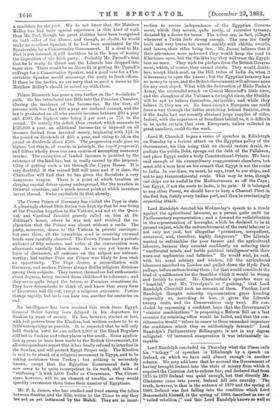Mr. F. L. James, who has studied and lived among
the tribes between Suakim and the Nile, writes to the Times to say they are not as yet influenced by the Mahdi. They are in insur-
rection to secure independence of the Egyptian Govern- ment, which they accuse, quite justly, of excessive tyranny, dictated by a desire for taxes. The tribes are, in fact, pillaged whenever a Pasha feels strong enough. The men are finely built and very brave, but armed mainly with shields, swords, and lances, their rifles being few. Mr. James believes that if their grievances were redressed they would keep the road to. Khartoum open, but the Sheikhs say they will trust the Egypt- ians no more. They wish for pledges from the British Govern- ment, which, of course, they cannot obtain. They would, doubt- less, accept black-mail, as the Hill tribes of India do, when it is necessary to open the passes ; but the Egyptian treasury has no money to spare, and the Britibh Government will advance none for any such object. What with the destruction of Hicks Pasha's Army, the successful attack on Consul Moncrieff's little force, and the slaughter of the Nubia= a fortnight since, the Sheikhs will be apt to believe themselves invincible ; and while they believe it, they are so. No force except a European one could force a way through the defiles stretching behind Suakim, even if the Arabs had not recently obtained large supplies of rifles. Indeed, with the experience of Isandlana behind us, it is difficult to be quite certain that even Europeans, unless collected in great numbers, could do the work.






































 Previous page
Previous page